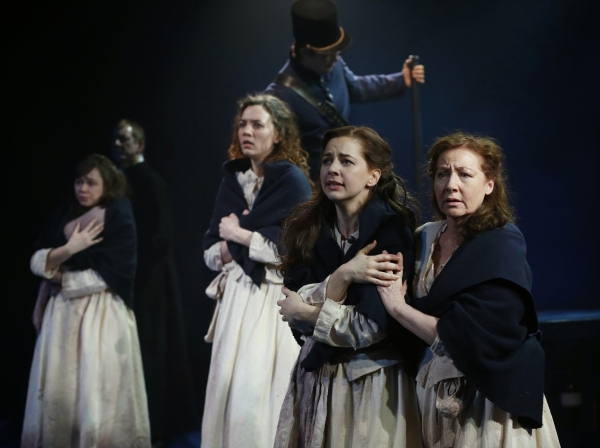Transport
Nineteenth century Irish women are at the center of this musical about a prison ship taking female convicts to Australia.

(© Carol Rosegg)
The sexual politics of the British Empire come into sharp focus in the world premiere of Transport, a new musical at the Irish Repertory Theatre. The show features a score by Black 47 front man Larry Kirwan and book by popular Australian novelist Thomas Keneally (Schindler’s List). While the music is stirring and the subject engrossing, the story takes far too many detours that mostly lead to dead ends.
Transport takes place in 1838 aboard the Whisper (vividly imagined by director Tony Walton, who also designed the set), a prison transport taking women from County Cork, in Ireland, to the penal colony of Sydney, Australia. There’s Bride Riordan (Pearl Rhein), who was sentenced to seven years for stealing butter. Soothsayer Maggie Carroll (Terry Donnelly) knows she’s "better off in hell or Australia." Considering that the following decade will see the population of her home country cut in half by the Irish Potato Famine, she’s probably right. Polly Cantwell (Emily Skeggs) is a protestant girl with a baby who the ship’s surgeon, Delamare (Edward Watts), is surprised to see on this boat full of Catholics. The women are guarded by Hennessy (Patrick Cummings), an Irish soldier in the British army who is just serving his time to get a land grant in New South Wales. Kate O’Hare (Jessica Grové) has big plans to hijack the ship and sail it to America (pronounced "A-mehr-i-kei"). She’ll have to go through Captain Winton (Mark Coffin) first. During the four-month journey the women fight with the men, dance jigs, and have nightmarish hallucinations of the future…you know, Irish things.
Coffin offers a thrillingly nuanced performance as Winton, delivering with delicious relish lines like, "Sir, I should tell you that I despise the Papist Mass, with its pretensions of cannibalizing Christ." Regularly perched on the quarter deck (which on this set appears more like a crow’s nest), he espouses a dry British devotion to "duty" which sharply contrasts with the weepy Irish melodrama happening below deck. Rhein offers a similarly multifaceted approach to Riordan; her relationship with the surgeon is the only one in the show with any real chemistry.
The subject matter is endlessly fascinating: According to the program note, over 40,000 Irish women were deported to Australia in the 1830s and '40s (often on trumped-up or fabricated charges) to help correct the gender imbalance (the result of so many male convicts) and to propagate a new colony of the British Empire on the other side of the world. Surrounded by water and thousands of miles from home, the Whisper becomes a microcosm for the United Kingdom of Great Britain and Ireland, where societal conflicts and inequalities become even more pronounced: Shortly before hauling anchor, Captain Winton informs Delamare that each member of his crew will choose a "sea-wife" from among the convicted women. The power dynamics are inescapable, but considering their precarious situation, this delicate social order can capsize like a rickety wooden ship in a storm at any moment.
Such heightened stakes should make for a thrilling musical. Unfortunately, too much of Keneally’s book feels forced: Moments highlighting historical and social realities spring up with every scene and are given little time to develop organically before we’ve moved on to the next. For instance, rebel Catholic Priest Father Manion (Sean Gormley) offers some ham-handed consolation to protestant Polly, saying things like, "You need to rest now, child. That’s my ordinary, human urging." It’s a pretty transparent kill-them-with-kindness conversion attempt and while it doesn’t work, by the end Polly takes the priest’s hand and says, "He’s my friend but I’m still not one of your breed." Even the otherwise deft Coffin struggles through Captain Winton’s Dickensian line, "There was a time when a lack of wealth cost me the affection of a handsome…" (He trails off.) This anorexic wisp of a backstory, perhaps meant to humanize the maritime tyrant, just comes off as awkward and half-considered.
Luckily, much of this two-hour affair is devoted to Kirwan’s driving Celtic sound, which is a rollicking mixture of traditional Irish music and 20th century chick rock. It’s slightly reminiscent of The Pogues and Flogging Molly. Lyrics like "Up to our necks in shite and sea water" fall trippingly off the tongues of this hearty-voiced cast.
The show ends with an upbeat song that has the entire cast clapping and chanting "Au-stral-i-ei" in celebration of their safe arrival Down Under. With its historical focus and catchy score, Transport could have a big future playing to crowds of Australian high school students studying 19th century migration to their country.









